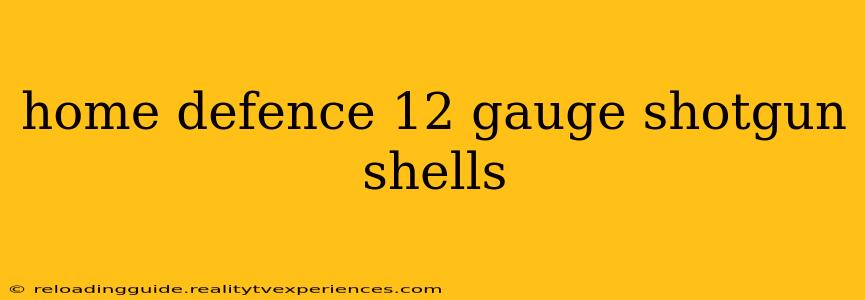Choosing the right ammunition for home defense is a critical decision, demanding careful consideration of various factors. While a 12-gauge shotgun is a popular choice for home defense due to its stopping power, selecting the appropriate shell type is equally, if not more, important. This guide will delve into the key considerations when selecting 12-gauge shotgun shells for home defense.
Understanding the Ballistics: Key Considerations
Before diving into specific shell types, let's understand the ballistic properties that make a shell suitable for home defense:
-
Stopping Power: This refers to the shell's ability to immediately incapacitate a threat. Factors contributing to stopping power include projectile weight, velocity, and energy transfer. Larger projectiles with higher energy transfer are generally preferred.
-
Penetration: While stopping power is crucial, excessive penetration is a significant concern in home defense scenarios. Over-penetration can injure innocent bystanders in adjacent rooms or even beyond your home. Finding a balance between stopping power and reduced penetration is paramount.
-
Pattern Density: Shotguns don't fire single projectiles like handguns or rifles. They fire a spread of pellets. A dense, consistent pattern ensures a higher probability of hitting the target, especially at close range.
Types of 12 Gauge Home Defense Shells
Several types of 12-gauge shells are marketed for home defense. Let's examine their pros and cons:
1. Buckshot
Buckshot shells contain larger lead or non-lead pellets, typically ranging from 000 (triple-ought) to #4.
-
00 Buck (Double-Ought): Offers excellent stopping power and relatively good penetration, making it a popular choice. However, over-penetration remains a potential risk.
-
000 Buck (Triple-Ought): Provides even greater stopping power than 00 buck, but at the cost of increased penetration. Use with extreme caution in confined spaces.
-
#4 Buck: Offers a wider spread pattern, reducing penetration, but sacrificing some stopping power compared to larger buckshot. A better option in densely populated homes.
2. Birdshot
Birdshot shells contain smaller pellets, designed for hunting birds. They are not recommended for home defense due to their limited stopping power and potential for ineffective incapacitation.
3. Slugs
Slugs are single projectiles, essentially large bullets fired from a shotgun. They offer maximum stopping power and penetration.
-
Rifled slugs: Feature grooves to increase accuracy and reduce spread. This makes them effective at longer ranges, but penetration is even higher than with buckshot, making them risky in residential settings.
-
Foster slugs: Less accurate than rifled slugs, but still provide significant stopping power. They are slightly less prone to over-penetration compared to rifled slugs but more than buckshot.
4. Reduced-Recoil Shells
These shells use lighter shot loads or specialized designs to reduce recoil, making them more manageable for users with less experience or physical strength. While reducing recoil is beneficial, it also usually reduces stopping power.
Choosing the Right Shell for Your Needs
The "best" shell for home defense is highly dependent on your specific circumstances. Consider these factors:
-
Your home's construction: Thicker walls reduce the risk of over-penetration, allowing you to consider shells with greater stopping power.
-
Occupancy: Homes with multiple occupants or neighbors in close proximity demand shells with reduced penetration potential.
-
Your experience and physical capabilities: If you lack experience, reduced-recoil shells might be a better starting point.
-
Your training: Proper training is essential for safe and effective home defense.
Disclaimer: This information is for educational purposes only. Always consult with law enforcement and firearms experts for personalized advice regarding home defense strategies and ammunition selection. Always practice safe firearm handling and storage. Laws and regulations regarding ammunition vary by location; be sure to comply with all applicable laws in your area.

